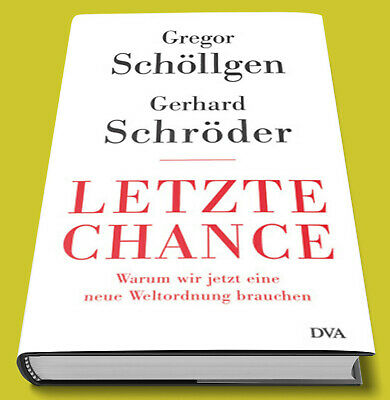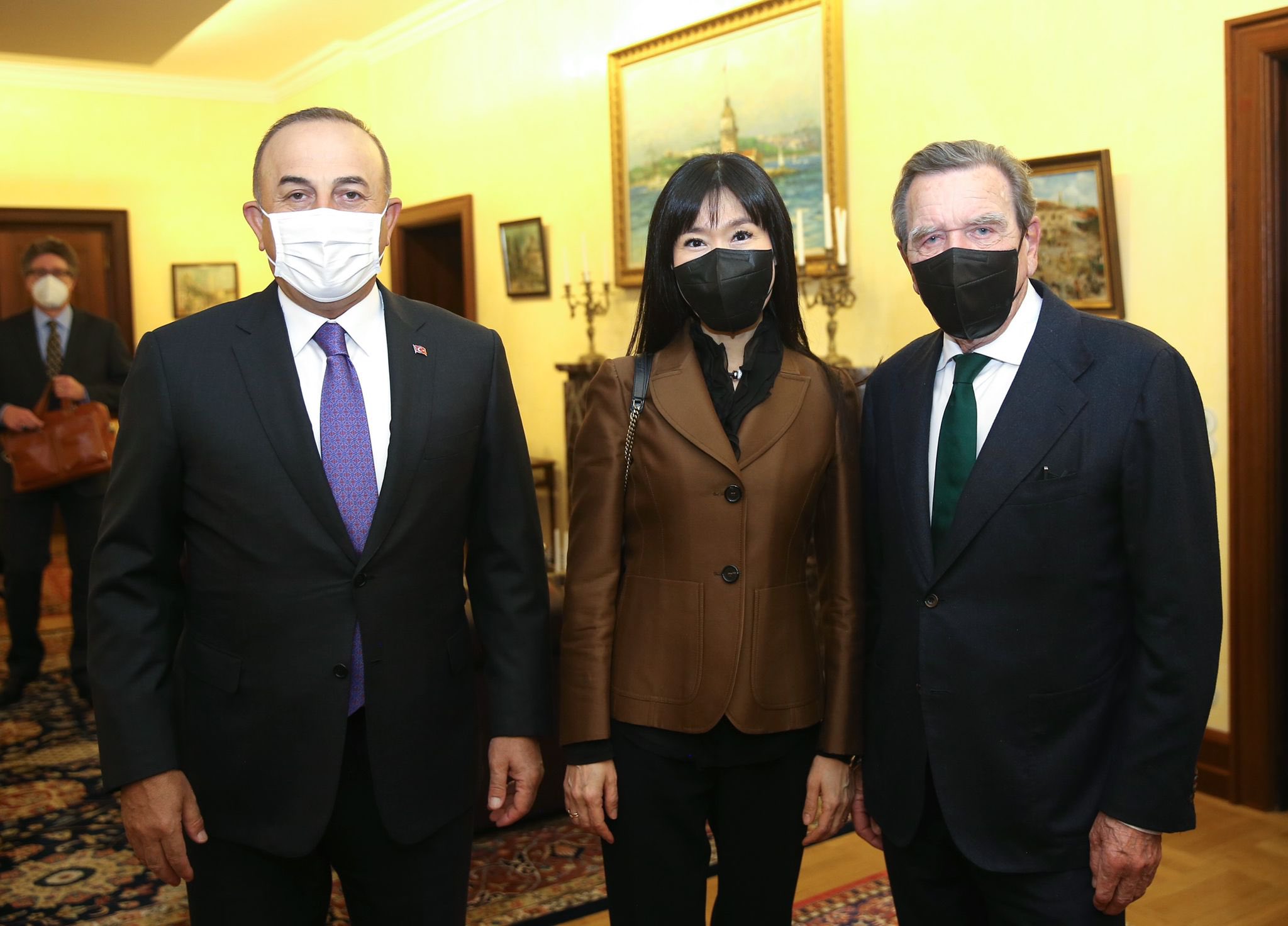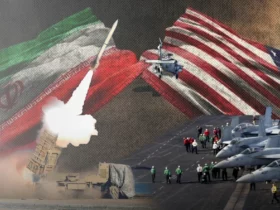By Gökhan Dağtekin
Gerhard Schröder’s book is not of significance, because it presents the ideas of an author who was formerly German Chancellor and today has executive duties in Russian gas companies. The books main value lies in the fact that it reflects a growing current in Europe. There is no doubt this current is positive in the point of view of Turkey and Eurasia, opening doors to dialogue and cooperation for us. I will discuss these aspects further below in the article. I would like to begin with describing and contextualizing this current.
This tendency or current represented by Gerhard Schröder is positive, because it takes a clear stance against the idea of Europe that progresses under US guidance. Schröder says that Europe needs to escape from US custody (in German he uses the expression ‘Vormundschaft’, that is ‘custody’, not ‘protection of’ or guidance of’). This does not mean that Schröder defends Eurasianism. I consider appropriate to define the current Schröder represents as moderate imperialism.
For instance, Schröder speaks of the French military interventions in Mali and elsewhere in Africa with great admiration, demanding Europe should also act in this way, on a greater scale. He repeatedly speaks of Macron with admiration, emphasizing that he shares the French President’s vision. Another example: The fact that US had refrained from intervention into crisis regions (until 9/11), after its soldiers were killed in Somali while the whole world was watching, was a very unfortunate development for the world, according to Schröder. Because Schröder defends the idea that the crises in the world grow deeper when the West does not take rational “responsibility” when necessary.
In Schröder’s view, China is a hegemonial power, all its claims in the Pacific and Asia are unjustified and artificial, and its hegemony driven expansive policies are the main factor in destabilizing the world. China has denied in the decisive primary phase the existence of the pandemic first, instead of fighting it, and enabled the Coronavirus to spread globally, because it is a totalitarian and repressive country. But afterward, again because it is a repressive country, it led a successful fight against the virus.

Europe’s internal chaos during the pandemic has provided China the opportunity to strengthen position in the old continent, inside the EU and the Balkans. While Europe is still “sleeping”, China is advancing very consciously on the road to take the reins. Although Russia and China have essentially no common interests at all, the inept Western policies push these two countries closer to each other.
In Schröder’s view, the world outside the West is a place of dark forces, set in fire, where everyone is hostile to each other, all governments are repressive, cruel, beyond law and justice. Humanity outside of the West is struggling in a dark age, where certain new powers emerge. The West needs to defend its positions in this world. Against whom?
It would be extremely wrong to deduce from the policy that seeks independence from the US a policy that wants to build a force against the US.
The former Austrian Foreign Minister Karin Kneissl expresses almost completely the same ideas as Schröder (see Karin Kneissl, Wachablöse – Auf dem Weg in die Chinesische Weltordnung, Vienna, 2017) Kneissl states that she follows tradition of Bismarck’s Realpolitik. Her criticism against the West and her statement of the emerging new world order do not mean that she advocates integration with Asia. Quite the opposite: Both Schröder and Kneissl criticize the West and specifically Europe for being inept and lacking a consequent will. They both argue that rising Asia threatens Europe’s position in the world, hence turning developing immediate, realistic solutions into an existential question. In this context, Schröder describes European ineptness with the word “dilettantism”. This current represented by Schröder and Kneissl says that, while not only China but also several countries such Turkey, Iran, Pakistan, P.R. of Korea are gaining positions, Europe heads the way to loose geopolitical competition against Asia. Politicians like Schröder, Kneissl, Sigmar Gabriel, Angela Merkel have recognized that Europe cannot win anything if it leans on the US or hands over the steering wheel to Washington. This fact is even acknowledged by Atlanticists like Friedrich Merz.
This current, which calls for independence from the US, basically advocates for the return to Grossmachtpolitik (great power competition) that existed prior to the Cold War. Schröder and Kneissl do not use this term, but the policy they describe converges fully with this policy tradition. They argue that a global policy cannot be pursued under American umbrella anymore, they state that the US is not capable to fulfill the duties of leadership for the imperialist-capitalist world. Hence these moderate imperialists propose unification on European level to balance the rising new powers.
We can define Bismarck’s policies as moderate imperialism. It avoids clashes and enters them only, firstly when it has to, and secondly when it had an advantaged position. This policy creates itself spheres of influence and hegemony, but at the same time respects the competitors’ spheres of influence within the balance of power. It is full of respect for power, it avoids adventures and acts rationally. It is not guided by ideology but realism and pragmatism. Hence, we can consider it as a relatively reasonable imperialism.
As Eurasianists in Turkey, we frequently defend the thesis that Europe heads towards “integration” with Asia, based on its disagreements with the US and on every field growing economical relations with Asian countries. Without getting into detail, I would like to question this argument with the following example.
In the 19th century, Western countries had very strong economical relations among each other, the mutual economical dependencies had reached a maximum level. In that period referred to as Belle Époque, the West was integrated to a degree not seen until the later neoliberal era. But these positive economical relations have not stopped Western countries from geopolitical competition and clashes.
Without a doubt, today’s moderate imperialists defend Nord Stream 2 or the economic relations with China, and it is undeniable that this positioning will reflect positively on economic and diplomatic relations. But it does not mean that geopolitical contradictions are over.
Karin Kneissl’s book starts, on the first page, with a quote from Xi Jinping, who describes the Belt and Road Initiative as designed to produce a win-win situation for all sides. But further in the text, China is described as a hegemonic power, whose projects do not always result in win-win situations. Kneissl reports that Beijing plays the game of geopolitics in a very conscious, intelligent and hard way. We can summarize the book’s message as follows: “For sure we cannot stay outside of the economic current, but we don’t believe in these tales of win-win, we will defend ourselves against you and develop strategies to keep you in check.”
Stating that the US retreats from Africa, Schröder detects that China and even Turkey is advancing their interests on the continent, calling Europe to urgently fill the gaps left behind by the US. The Schröders and Kneissls recognize that Western hegemony over the world is coming to an end, but they are not willing to give up the whole wide world to the rising Asian competitors.
There is no doubt that the main threat against Turkey is originating in the US and Israel. Our focus on these countries is therefore logical. But if we explain every event in the dichotomy of Pro-American/Anti-American or Atlanticist/Eurasianist, we run the risk to interpret the strategic orientation of European actors wrongly or inadequately. The dichotomy of Atlanticist/Eurasianist is very meaningful and describes the decisive dialectic in the countries that are targeted by imperialism. But in imperialist Western countries, this dialectic is not valid the same way. Europe’s disagreements with the US are to Asia’s advantage, but they do not mean integration with Asia.
In Europe, nationalist actors such as Le Pen, AfD (Alternative for Germany) can to an important degree be considered as Eurasianists. The system attacks these nationalists who oppose globalization with all its might, in other words, the nationalists are fighting with the system. Besides, a “Europe of Nations” cannot realistically claim any meaningful global domination, even if it wanted to.
The moderate imperialists are very well aware of that. They defend to give up national sovereignty to a great degree and to unite all force at the European Union level. Their calculation is that facing the US on the one side, that doesn’t take Europe seriously, and China and rising Asia on the other, Europe can defend its imperialist interests to a certain degree only by uniting. For this purpose, Europe needs to unite in an at least confederative and at best federative structure. For this reason, the great majority of the ruling classes in Europe is hostile to the nation-state. Hostility to the nation-state is existential: One leg of this strategy is to dissolve the nation states in the oppressed world; the other leg is Europe’s unification. A compromise between Europe’s systemic forces and the Le Pens and AfDs is not possible. Albeit with a different direction and purpose, the dissolution of the nation-state domestically and internationally is existential for imperialism.
We need to state this clearly: The “Europe of Nations” would integrate with Asia. This current has neither any other option nor the force to resist this. A united Europe on the other hand is the program and strategy to continue Europe’s claim of imperialist interests in changing world conditions.
The project: Europe as an independent power between America and Asia
It is worth to remember some points on the history of Gerhard Schröder. He was the politician that decided not to take part in the war against Iraq, and he always defended to solve problems with Russia by dialogue. But there are facts too:
1. Schröder was the Chancellor that realized the neoliberal conversion of Germany. It would not be too wrong to characterize him as “Germany’s Margaret Thatcher”.
2. Schröder was the Chancellor who led Germany into the Kosovo war. Germany has the first time since World War II participated in a war of aggression.
3. He was so keen on Germany’s participation in the Afghanistan war, he even connected the parliament’s approval with a vote of confidence on himself. His political career and his warmongering policies were tied to this degree. His Defense Minister Struck’s statement that “Germany will be defended on the Hindukush (Afghanistan, GD.) has become an expression of great power politics, not of Americanism or Anti-Americanism.
These events constituted profound, paradigmatic changes in Germany’s history. A right wing government could not make them; only a leftist government could achieve these paradigmatic changes. Germany’s path to neoliberalism and globalization was essentially opened during Schröder’s governance. These are not simple changes in economic policy; they are part of a fundamental, imperialist policy program. Since the foundation of the Federal Republic of until the days of Schröder, 1999, it was considered a state doctrine that Germany could never participate in any war except for defense of the homeland. The German constitutions Article 26 prohibited any wars of aggression. Therefore, this position was also considered a legal doctrine and evaluated as based on the consensus on all parts of the society.
Schröder faced the public opinion, his own party and his own bases, and his politics caused a great outcry. Gerhard Schröder’s opinion has not changed since his days as Chancellor. He was also defending the notion that Europe needs to take “responsibility” globally during those days too.
To make my point clear: Moderate imperialists do not demand the European Army in order to make its soldiers companions to Turkish soldiers, comrades to Chinese soldiers, brothers in arms to Iran’s soldiers. They criticize the weak and inept policies of the West. They mention the reality of rising Asia, the reality of multipolarity, the changing balances on every occasion, but they express at the same time on every occasion their evaluation of rising Asia as a geostrategic competitor.
In Europe there is a differentiation between the Atlanticists and the moderate imperialists concerning strategy and policies. This differentiation is important and meaningful. But this is not the main contradiction in Europe. Both forces operate within the parameters of the imperialist system. In spite of important differences in policies, there are no clashes between them. The Atlanticists and the moderate imperialists, which exist in main political parties side by side, determine the policies together. The thesis of a profound clash between them is not defendable. The main conflict takes place between those who defend the system, i.e. the Atlanticists and the moderate imperialists, on the one side and the nationalists on the other. Our interests align in the competition within the system with those of the moderate imperialists, in the main conflict with those of the nationalists.
The moderate imperialist’s worth as seen from Turkey
The fact that the current, which Schröder represents, is not Eurasian does not diminish its value. The nationalists in Europe are valuable in so far and as long as they fight the existing system. But currently, they do not command a decisive force within the system. The cases of Le Pen and Trump demonstrated that, even if they win elections, the real governance of the country will not be handed to them easily. Whatever vote they get in elections, even if they get to constitute the government, nationalists are kept out of the mainstream politics.
Moderate imperialists on the other hand are valuable for us, because they are part of mainstream politics, because they are a inherent and central element of European ruling classes. The moderate imperialists are at the height of power in Europe, they are governing the countries together with the aggressive imperialists (Atlanticists).
Most importantly, the moderate imperialists represent independence from the US. The dissolution of the imperialist front is a very important event for humanity. This tendency also opens the path of Turkey towards Asia. Besides, as defined and argued above, moderate imperialists are not aggressive. Their attributes are ceding priority to diplomacy, pursuing balanced policies and having pragmatic approaches. This current respects power, is realistic and moderate. We encounter in them actors that are always open to joint positions within given balances of power.
Under these circumstances, we can forecast that Europe’s geopolitical competition with Asia will continue in parallel to developing economic and diplomatic relations, providing always opportunities for cooperation.
It is not hard to see that Europe and Asia’s economic relations will continue deepening. But Europe might as well take protective steps against China’s strategic influence or position itself against the Asian forces’ geopolitical advance from time to time. To qualify such approaches only as “influence of the Atlanticists” or “surrender to the US” would be a wrong interpretation that contradicts the reality. Such policies are not imposed by the US, they are Europe’s very own stance.
Conclusion
We can of course not afford to place all imperialists in one basket. This is not a revolutionary but stupid stance. For us as revolutionaries, the moderate imperialists in the West are one of the most important forces we need to support and ally with against the Atlanticists. We need to develop according political relations quickly.
It is very probable that these forces will approach friendly relations positively. These forces are at the end of the day very well aware of the strength of Eurasianists in Turkey and elsewhere. Even though they approach world politics from the opposing angle, they confirm in every sentence the analysis of the Eurasianists.
Alarm bells are ringing for Europe. The changing world order worries them deeply. In the words of Schröder, Europe is seeking its “last chance”. For us, on the contrary, the road is wide open.

















Leave a Reply